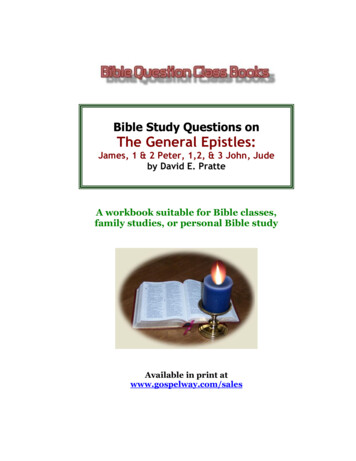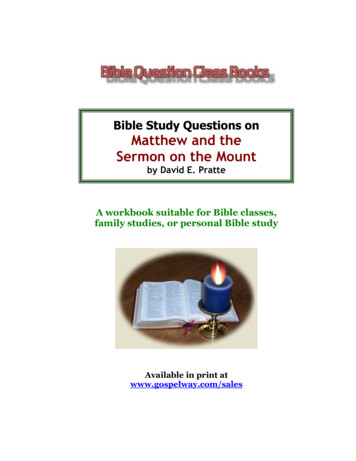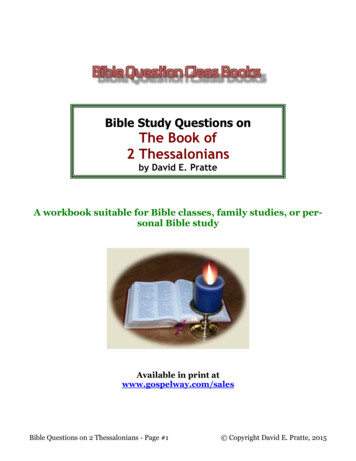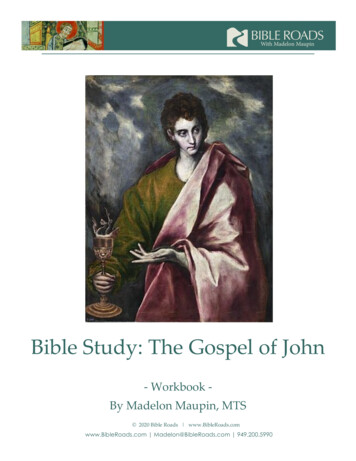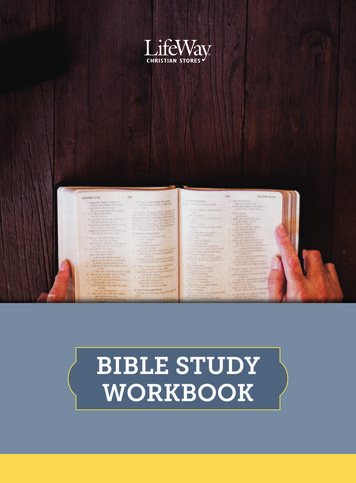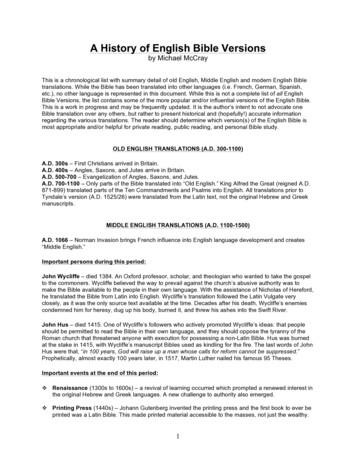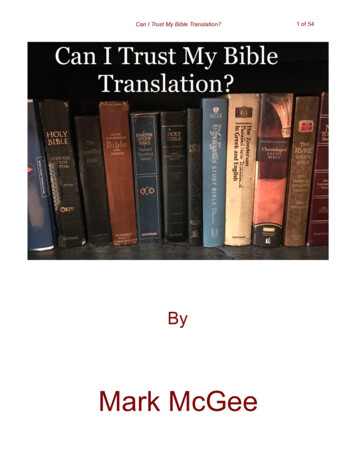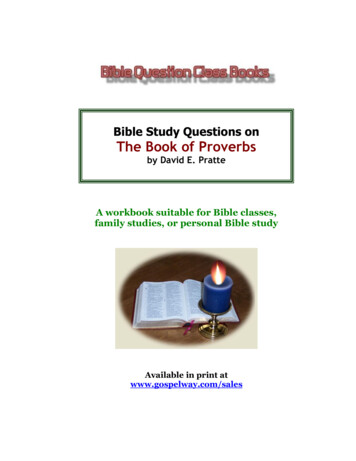
Transcription
Bible Study Questions onThe Book of Proverbsby David E. PratteA workbook suitable for Bible classes,family studies, or personal Bible studyAvailable in print atwww.gospelway.com/sales
Bible Study Questions on the Book of Proverbs:A workbook suitable for Bible classes, family studies,or personal Bible study Copyright David E. Pratte, 2015All rights reservedISBN-13: 978-1516930685ISBN-10: 1516930681Printed books, booklets, and tracts available atwww.gospelway.com/salesFree Bible study articles online atwww.gospelway.comFree Bible courses online atwww.biblestudylessons.comFree class books atwww.biblestudylessons.com/classbooksFree commentaries on Bible books atwww.gospelway.com/commentaryContact the author atwww.gospelway.com/commentsNote carefully: No teaching in any of our materials is intended or should ever beconstrued to justify or to in any way incite or encourage personal vengeance orphysical violence against any person.“He who glories, let him glory in the Lord”– 1 Corinthians 1:31Front Page PhotoThe Temple in Jerusalem(Model of an artist’s conception)“And when the queen of Sheba had seen the wisdom of Solomon, the house that he had built, Then she said to the king: ‘It was a true report which I heard in my own land about your wordsand your wisdom. and indeed the half of the greatness of your wisdom was not told me. Youexceed the fame of which I heard. Happy are your men and happy are these your servants, whostand continually before you and hear your wisdom!’” – 2 Chronicles 9:3-7 (NKJV)Photo credit: Public domain, via Wikimedia CommonsWorkbook on ProverbsPage #2
Other Books by the AuthorTopical Bible StudiesGrowing a Godly Marriage & Raising Godly ChildrenWhy Believe in God, Jesus, and the Bible? (evidences)The God of the Bible (study of the Father, Son, and Holy Spirit)Grace, Faith, and Obedience: The Gospel or Calvinism?Kingdom of Christ: Future Millennium or Present Spiritual Reign?Do Not Sin Against the Child: Abortion, Unborn Life, & the BibleTrue Words of God: Bible Inspiration and PreservationCommentaries on Bible BooksGenesisJoshua and RuthJudges1 SamuelEzra, Nehemiah, and EstherJobProverbsGospel of MarkGospel of JohnActsRomansEphesiansPhilippians and ColossiansHebrews1 & 2 PeterBible Question Class BooksGenesisJoshua and RuthJudges1 SamuelEzra, Nehemiah, and EstherJobProverbsEcclesiastesIsaiahGospel of MatthewGospel of MarkGospel of LukeGospel of JohnActsRomans1 Corinthians2 Corinthians and GalatiansEphesians and PhilippiansColossians, 1&2 Thessalonians1 & 2 Timothy, Titus, PhilemonHebrewsGeneral Epistles (James - Jude)RevelationWorkbooks with Study NotesJesus Is Lord: Workbook on the Fundamentals of the Gospel of ChristFollowing Jesus: Workbook on DiscipleshipGod’s Eternal Purpose in Christ: Workbook on the Theme of the BibleVisit our website at www.gospelway.com/sales to see a current listof books in print.Page #3Workbook on Proverbs
Bible Study Questions on the Book of ProverbsIntroduction:This workbook was designed for Bible class study, family study, or personal study. The classbook is suitable for teens and up. The questions contain minimal human commentary, but insteadurge students to study to understand Scripture.Enough questions are included for teachers to assign as many questions as they want for eachstudy session. Studies may proceed at whatever speed and depth will best accomplish the needsof the students.Questions labeled “think” are intended to encourage students to apply what they have learned.When questions refer to a map, students should consult maps in a Bible dictionary or similarreference work or in the back of their Bibles. (Note: My abbreviation “b/c/v” means “book,chapter, and verse.”)For class instruction, I urge teachers to assign the questions as homework so students cometo class prepared. Then let class time consist of discussion that focuses on the Scripturesthemselves. Let the teacher use other Scriptures, questions, applications, and comments topromote productive discussion, not just reading the questions to see whether they were answered“correctly.” Please, do not let the class period consist primarily of the following: “Joe, will youanswer number 1?” “Sue, what about number 2?” Etc.I also urge students to emphasize the Bible teaching. Please, do not become bogged downover “What did the author mean by question #5?” My meaning is relatively unimportant. The issueis what the Bible says. Concentrate on the meaning and applications of Scripture. If a questionhelps promote Bible understanding, stay with it. If it becomes unproductive, move on.The questions are not intended just to help students understand the Scriptures. They are alsodesigned to help students learn good principles of Bible study. Good Bible study requires definingthe meaning of keywords, studying parallel passages, explaining the meaning of the text clearly,making applications, and defending the truth as well as exposing religious error. I have includedquestions to encourage students to practice all these study principles.Note that some questions on this book are more difficult and advanced. The study leader maywant to skip some questions if he/she is teaching a less advanced study.Finally, I encourage plain applications of the principles studied. God's word is written so soulsmay please God and have eternal life. Please study it with the respect and devotion it deserves!For whatever good this material achieves, to God be the glory.Bible study commentary and notes to accompany some of our workbooks areavailable at www.gospelway.com/sales David E. Pratte, June 21, 2017Workbooks, commentaries, and topical studies for sale in print atwww.gospelway.com/salesTo join our mailing list to be informed of new books or special sales, contact theauthor at www.gospelway.com/commentsWorkbook on ProverbsPage #4
Assignments on Proverbs 1Please read Proverbs 1 and answer the following questions.1. Read as much of the book of Proverbs as you can and summarize its theme.2. Define “proverb.”3. What men wrote various of the Proverbs? Give proof.4. Special Assignment: List some of the main events in the life of Solomon. Give book,chapter, & verse (b/c/v) for your statements.5. Explain why this book was written (1:2).6. Define “wisdom,” “instruction,” and “understanding.”7. What other purposes are accomplished by the Proverbs (1:3-6)?8. What is the source of true wisdom – 1:7? What lessons can we learn?9. What are some methods that evil people use to entice others to participate with them in sin– 1:10-16?10. What advice does Solomon give to help his son avoid temptation to evil?11. What consequences come to those who are greedy of gain – 1:17-19?Page #5Workbook on Proverbs
12. Application: What lessons should we learn from Solomon’s advice in 1:10-19?13. Summarize the theme of 1:20-33. (Think: How is the term “wisdom” used in the book ofProverbs?)14. In what places does Wisdom call to people – 1:20,21? (Think: What can we learn?)15. What question does Wisdom ask in 1:22? How does the verse describe those who do notaccept wisdom? (Think: In what sense do such people hate knowledge?)16. What does Wisdom call on the people to do? What promise does she make – 1:23?17. How had people reacted to Wisdom’s call – 1:24,25?18. Define reproof and counsel.19. What problems does Wisdom say would come upon the people, and how would she react– 1:26,27?20. What will people do when terror comes upon them, and what problems will they have –1:28-31? Why would these problems occur?21. Application: What should we learn from these warnings? Give examples.22. What warning does Wisdom give and what promise does she make in 1:32,33?Workbook on ProverbsPage #6
Assignments on Proverbs 2Please read Proverbs 2 and answer the following questions.1. What attitude should we have toward wisdom according to 2:1,2? What will we do if we havethis attitude?2. How does Solomon describe the desire we should have for wisdom in 2:3? What does thisshow about our human wisdom compared to wisdom we obtain from another source?3. If one has the proper appreciation for wisdom, how diligently will he work to obtain it –2:4? Give examples to illustrate how people search for treasure and material wealth.4. Application: What lessons should we learn about what we should do to obtain wisdom?What are some specific things we should do to obtain wisdom?5. If we search for wisdom in the proper way, what promise does God make in 2:5?6. List other passages showing God’s word can be understood if we study properly.7. What is the proper source of wisdom – 2:6? What does God promise to do for those whowill seek wisdom from Him – 2:7,8?8. What will result from a diligent search for wisdom according to 2:9-11?9. Is the Bible to blame for the fact that people do not understand it? Explain.10. Case Study: A friend says, “I tried to study the Bible once, but I decided I just couldn’tunderstand it, so I quit trying.” What conclusions can we reach from the context about why somepeople do not understand the Bible?Page #7Workbook on Proverbs
11. From what can wisdom deliver us – 2:12-15?12. List characteristics from these verses of the person who travels the way of evil.13. Application: How does our society – especially entertainment – often view the kind ofperson described in these verses? How does this differ from the way wisdom views them?14. In particular, from what kind of woman does wisdom deliver us in 2:16? Where else is sucha woman described in the book of Proverbs?15. What kind of speech is she guilty of? Why would such a woman speak this way?16. How is she described in verse 17? Explain.17. What are the consequences of following her according to verses 18,19?18. Application: What lessons should young men and young women learn from thedescription of this woman?19. Rather than walking in the paths of evil, what can wisdom lead us to do – 2:20?20. Why is it important to walk in this path rather than the path of evil – 2:21,22?21. Case Study: Suppose a person is serving God but wonders whether or not he is goodenough to receive eternal life. Explain how this discussion of wisdom can help him.Workbook on ProverbsPage #8
Assignments on Proverbs 3Please read Proverbs 3 and answer the following questions.1. What should we do with the commands we receive that are based on God’s law? Whatblessings can they give us – 3:1,2?2. What qualities should we cling to according to 3:3? How firmly should we hold them?Explain. What benefits would they give us – verses 3,4?3. From where does proper guidance come? From where does it not come – 3:5,6?4. Application: Give examples that demonstrate how people often trust in their ownunderstanding rather than in the Lord.5. What leads people to trust their own wisdom instead of that of God? What is the benefit offearing God – verses 7,8?6. What should we do with our possessions? Explain how we do this. What benefits will wereceive – 3:9,10?7. How should we view chastisement from the Lord? Where is this quoted in the NewTestament? How does the passage illustrate God’s chastisement of us – 3:11,12?8. Application: Discuss some ways God may chastise his people. What are some ways peoplesometimes demonstrate that they do not appreciate this chastisement?9. What man is truly happy – verses 13-15? How valuable are these qualities?10. Wisdom leads to what blessings – 3:16-18? Explain how this may happen.Page #9Workbook on Proverbs
11. How does Solomon demonstrate the value of wisdom and knowledge – 3:19,20? Explainhow these things demonstrate God’s wisdom.12. When people truly value wisdom and discretion, what will they do with them – 3:21?Explain why.13. What benefits will wisdom and discretion give – 3:22,23? Why is this important?14. How will wisdom affect our fears – 3:24-26? What is the source of this confidence? Whatshould we learn?15. What good should we practice? How do people sometimes try to avoid helping others –3:27,28?16. Application: What two conditions are given for helping others? Give examples ofsituations that meet the conditions and examples of situations that do not.17. How should we treat a neighbor – 3:29? How does this differ from the world’s idea?18. What conduct is forbidden in verse 30? What condition is given? (Think: What might wedo if this condition is not met?)19. Whom should we not envy according to 3:31-33? What reasons are given?20. How does God treat scorners – 3:34,35? To whom does He give grace?21. List other similar passages about how God treats the humble.Workbook on ProverbsPage #10
Assignments on Proverbs 4Please read Proverbs 4 and answer the following questions.1. What does the father urge his children to do in 4:1,2? Why?2. What had his parents taught him – 4:3,4?3. Application: What should parents and children learn from these instructions?4. How important is it to obtain wisdom and understanding – verses 5-7? Why?5. When we have wisdom, what should we do about it?6. What will wisdom do for us when we have it – verses 8,9?7. What are the advantages of following in the way of wisdom – 4:10-12?8. What should we do with instruction – 4:13? Why is this important?9. What should we do when we see the way wicked people walk – 4:14,15?10. How does this differ from the way most people treat evil?11. Case study: A friend says, “Sure I read ‘Playboy Magazine’ and watch X-rated movies. Ifigure it doesn’t hurt to think about those kinds of things as long as I don’t do anything immoral.”How do the principles taught in Proverbs apply to such thinking?Page #11Workbook on Proverbs
12. How does Solomon describe the sleep of the wicked – 4:16? What is the point?13. What is the diet of those who walk in evil – 4:17? What lessons should we learn?14. In contrast to the path of evil, what path is described in verse 18? How is it described? Inwhat sense is this true?15. How does the path of the wicked contrast to the path of the just – 4:19? What effect doesdarkness have in their lives?16. How many paths has Solomon described for people to choose from? Why only thisnumber? Where else are similar points made in Scripture?17. Once again, what does Solomon urge his son to do in verses 20-22? Why?18. Why is the condition of the heart important – 4:23? Explain the point.19. Where else is the point of verse 23 taught in Scripture?20. Application: How does verse 23 explain the evil that people often commit? Whatapplication should we make for our own lives?21. What does Solomon teach about our speech in 4:24? What applications need to be madeto modern society?22. What must we do, according to verses 25-27, in order to make sure that we remain on theproper path in life? Explain the point.Workbook on ProverbsPage #12
Assignments on Proverbs 5Please read Proverbs 5 and answer the following questions.1. Read Proverbs chapter 5 and state the main theme discussed.2. What advice does Solomon give to his son as he begins the discussion? What benefit willthis be to him – 5:1,2?3. What danger does Solomon warn his son about beginning in 5:3? Explain the significanceof the oil and the honey.4. In contrast to verse 3, what is the end result of the immoral woman – verse 4? Explain thesignificance of the wormwood.5. Where do her feet lead – verse 5? Explain the point.6. What characterizes the path that she walks – 5:6? What should a man learn?7. What solution does Solomon give his son to deal with this problem – verses 7,8?8 List and explain 3 passages elsewhere that show the importance of avoiding fornication.Page #13Workbook on Proverbs
9. Application: Explain how the principles of this context should be applied and how theseprinciples would help in dealing with the problem.10. What consequences would follow to one who does not avoid this evil – 5:9?11. What happens to the wealth and the work of one who pursues an immoral woman – verse10? Give examples to illustrate.12. What is the end result of disregarding this teaching – verse 11?13. When a young man gives in to seduction, how does he view the teaching he has receivedabout morality – 5:12,13?14. Explain the significance in 5:14 of the reference to the midst of the assembly andcongregation. Does the fact that a person participates in spiritual activities and appears to beupright guarantee protection against sexual immorality? Explain.15. Explain the illustration used in verse 15. How does this apply to the discussion about sexualimmorality?16. How do verses 16 and 17 contrast to verse 15? Again, explain the illustration.Workbook on ProverbsPage #14
17. What practice will help a man avoid immorality – 5:18?18. How does Solomon describe the beauty of marital love as compared to immorality in verses19,20?19. List other passages that show the propriety of the sexual relationship in marriage incontrast to outside marriage.20. Special assignment: According to the context, should a couple reserve only theultimate union for marriage, or is there more that should also be reserved for marriage? Explainthe significance to immoral conduct.21. What reason is given in 5:21 for practicing moral uprightness?22. What consequences of immorality are described further in verses 22,23?23. Application: Suppose a young unmarried couple confides to you that they are stronglyattracted to one another physically and it is hard for them to remain pure. List several practicalsuggestions based on our study that would help them.Page #15Workbook on Proverbs
Assignments on Proverbs 6Please read Proverbs 6 and answer the following questions.1. Define surety. List other Scriptures about it.2. What problems can be caused by agreeing to be surety for another person? Give someexamples. (Think: Is Solomon saying that becoming surety is sinful? Explain.)3. What advice does Solomon give to those who have agreed to be surety – 6:3-5? How mightthis solve the problem?4. Define “sluggard” and “slothful.” Where does Solomon say a lazy person should go to learnimportant lessons – 6:6-8?5. Application: Explain some lessons a lazy man could learn from studying ants.6. Instead of working, what does a lazy person prefer to do – verses 9-11? What consequenceswill come as a result? Explain.7. What are some characteristics of a worthless or perverse man – 6:12-15?8. What consequences will come as a result? Give examples.Workbook on ProverbsPage #16
9. Define abomination. List and explain 3 passages that show God hates evil.10. List the 7 abominations of 6:16-19, and explain the meaning of each in your own words.For each of these 7 abominations, list a scripture elsewhere that discusses it.11. To what subject does Solomon return beginning in 6:20? Whose responsibility is it toinstruct children?12. In what way do the instructions of parents benefit the children according to 6:21-23? Arecommand keeping and reproofs good or bad? Explain.13. To what subject does Solomon return beginning in verse 24? What method does an evilwoman use to seduce a man according to verse 24? Give examples.Page #17Workbook on Proverbs
14. What other means may an evil woman use to allure a man according to 6:25? Giveexamples.15. Application: Define lust. Many people see no harm in enjoying thoughts of illicitintimacy (such as in entertainment, pornography, etc.) so long as one does not actually doanything wrong. What can we learn about this from the instructions here and elsewhere?16. How does Solomon describe the consequences of adultery in verse 26? Explain.17. What illustrations are used to demonstrate the danger of adultery in 6:27-29? Explainthem. What lessons should we learn?18. How do people view stealing according to verses 30,31? Yet what consequences may ithave? How does this relate to the discussion of adultery?19. So, what consequences of adultery are described in 6:32,33?20. What other concern can adultery lead to according to verses 34,35? What lessons shoulda young man learn?Workbook on ProverbsPage #18
Assignments on Proverbs 7Please read Proverbs 7 and answer the following questions.1. What does Solomon tell his son about the value of his commandments in 7:1-4?2. What is the significance of referring to the law as the apple of one’s eye? What does it meanto say that wisdom is one’s sister?3. What danger does Solomon discuss again in 7:5ff? What means does she use to seduce?4. How does Solomon describe the seduction of a young man beginning in 7:6? (Think: Incontrast to Solomon’s description, how would modern entertainment treat such a story?)5. What can we learn from the circumstances under which the young man passes by thewoman’s home – verses 7-9? What kind of young man was he? What time of day was it?6. How is the woman described in 7:10? What is the significance of the crafty heart?7. Application: How is the clothing of the seductress described in verse 10? What shouldgodly women learn? If such clothing becomes the fashion, what should godly women do?8. How is the woman described in 7:11,12? List passages showing how a godly woman shouldbe rather than loud and rebellious? What should godly men and women learn?9. What is the significance of saying that she refuses to stay at home? How does this differfrom the Bible teaching about a godly woman?10. How does she greet the young man – 7:13-15? What can we learn about the manner inwhich she expresses her affection?Page #19Workbook on Proverbs
11. What is the significance of the fact that she said she has paid her vows? What does thisshow about the nature of her religion?12. How does the seductress describe her bed in 7:16,17? What is her point?13. What proposition does she make in 7:18? How does her concept of love compare to thebiblical meaning?14. Where is her husband – verse 19? Why does she say this? What does this tell you abouther right to enter into the relationship that she suggests?15. What additional information does she give in 7:20? What is her point?16. Application: What similarities exist between the efforts of the seductress and theconcept of so-called safe sex? What assurance do advocates of safe sex attempt to give?17. According to verses 21,22, what effect do her efforts to seduce have on the young man?How does Solomon illustrate his decision to go in verse 22?18. How are the consequences described in 7:23? Explain the illustrations.19. So, what guidance does Solomon give regarding such conduct in verses 24,25?20. How does Solomon describe in 7:26 those who give in to seduction? What is thesignificance of the reference to strong men? Can you give examples?21. What is the final consequence according to verse 27?Workbook on ProverbsPage #20
Assignments on Proverbs 8Please read Proverbs 8 and answer the following questions.1. Special Assignment: As we study through chapter 8, make a list of the characteristics ofwisdom: what it is and what it does.2. Where does wisdom speak and lift up her voice – 8:1-4? To whom does she call?3. What does the call of wisdom teach us about spreading the gospel? Whom should we teach?What limit should there be on those who are subject to the teaching of God’s word?4. Describe the kinds of things that wisdom says she speaks – 8:5-8. What kinds of thingsdoes she not speak?5. What conclusions can we reach about those who would disagree or contradict the wisdomfound in the word of God?6. How do verses 10,11 describe the value of wisdom? What lesson should we learn?7. What other qualities come closely associated with wisdom – 8:12? Explain these terms andwhy they are important.8. If we fear the Lord, what will we hate – 8:13? Is it proper for Christians to hate? Explain.9. What benefits does wisdom provide according to 8:14? How can these benefits help us?10. Who needs wisdom according to verses 15,16? How would wisdom benefit these people,and how does a society suffer when wisdom is lacking with these people?Page #21Workbook on Proverbs
11. Application: What does wisdom promise in 8:17? Explain the application to us.12. What blessings does wisdom give according to 8:18,19? Explain and give examples.13. What characterizes wisdom according to 8:20,21? How would this benefit us?14. What does 8:22,23 teach us about the history of wisdom? What lesson should we learn?(Think: Some have claimed this proves that wisdom here is a reference to Jesus Christ. Whatevidence exists for such a viewpoint?)15. List the things that God made according to 8:24-31.16. List other passages that describe the wisdom of God demonstrated in creation.17. Special Assignment: Explain why wisdom was especially important in the context ofthe creation. How does the creation demonstrate the wisdom of God?18. What lesson should the history of wisdom teach us – 8:32,33? Explain.19. Understanding the value of wisdom, what should we do – 8:34,35? What blessings canthey give us?20. On the other hand, what does wisdom affirm about those who reject her – 8:36?21. Application: Can you think of an instance in your own life when you needed wisdom butlacked it? Please describe briefly.Workbook on ProverbsPage #22
Assignments on Proverbs 9Please read Proverbs 9 and answer the following questions.1. What is wisdom described as doing in 9:1,2? Explain what is pictured in the context.2. How does she extend invitations – 9:3?3. Who is invited to partake of her feast – 9:4,5? So what does the feast represent?4. What benefit will people receive who participate – 9:6?5. Application: What lessons can we learn about man’s free will power to choose and howGod instructs people in His will? Does God force people to listen and learn His will? If we want tobenefit, what must we do?6. What happens when you reprove a scoffer or a wicked man – 9:7,8?7. What is a scoffer? Why do such people respond in this way?8. How do wise and upright people respond to rebuke and instruction – 9:8,9? Why do theyrespond in this way?9. List other passages about rebuking sin.10. Case Study: A friend says: “It’s not Christ-like to criticize other people’s religious beliefs.If people sincerely believe a thing, why should other people tell them it’s wrong? Just preach thegospel but let other people alone.” What can we learn about such views in Proverbs?Page #23Workbook on Proverbs
11. From what source can we get wisdom – 9:10? Where else does the teach book this?12. What benefits can we receive if we participate in the feast wisdom offers – 9:11?13. Who ultimately benefits if you participate in the feast wisdom offers – 9:12? If you scoffand reject wisdom, who ultimately suffers the consequences? Explain.14. Application: Can other people help you gain wisdom? Who ultimately determines thewisdom that you obtain? What lessons should we learn?15. What other woman has a feast to offer? How is she described – 9:13?16. How does she invite people to participate in her feast – 9:14,15?17. Application: What can we learn from the fact that evil and foolishness invite and enticepeople to participate? Can Satan compel people against their will to be evil?18. How does evil appeal to some people – 9:17? Explain.19. Explain the concept of stolen waters in contrast to drinking from one’s own fountain insexual matters as discussed in chapter 5. What lesson should we learn?20. What happens to those who accept the foolish woman’s invitation – 9:18?21. Application: What lesson can we learn from the fact that there are 2 feasts offered in thischapter? When God offers a blessing, what can we expect Satan to do?Workbook on ProverbsPage #24
Assignments on Proverbs 10Please read Proverbs 10 and answer the following questions.1. How does the conduct of the child affect the parents – 10:1? List other passages aboutparents raising their children.2. How does the Lord distinguish the righteous from the wicked – 10:2,3?3. How is diligence better than laziness – 10:4,5? What should children learn?4. Explain the contrast between the memory of the righteous and that of the wicked – 10:7.Why is this so?5. How does a truly wise man view God’s commands – 10:8? Define “prate.” How does thisdiffer from wisdom?6. How does integrity compare to perverseness – 10:9? How does this happen and why doesit matter?7. Explain how the speech of righteous people becomes a source of life – 10:11. (Think: In whatsense does winking with the eye cause trouble – 10:10?)8. How does love cover sin – 10:12? Does this mean we should simply overlook the sins ofothers? List other passages that help. (Think: List ways that hatred stirs up strife.)9. How does the speech of wise people differ from that of foolish people according to 10:13,14?Explain why a fool needs a rod for his back.10. How is the wealth of a rich man viewed in contrast to the poverty of a poor man – 10:15?But what is more important than wealth or poverty – verse 16?Page #25Workbook on Proverbs
11. According to 10:17, why is it important to have the proper attitude toward instruction ascompared to reproof? How does this differ from the way people often think?12. In what sense is hiding hatred a form of lying – 10:18? Why is slander foolish?13. Application: Explain why there is danger in being a person who speaks a lot – 10:19. Isthe solution to simply remain quiet – 10:20,21? Explain.14. What can we know to be true about the blessings that God gives – 10:22? How does thisdiffer from the way people sometimes treat one another?15. How do foolish people often view sin – 10:23? Explain why this is a mistake.16. What are some fears that wicked people may have that are likely to come true – 10:24,25?What are some desires that righteous people have that are likely to come true?17. How does a lazy man’s conduct affect those around him – 10:26? Give examples.18. What blessings are described for righteous people in verses 27-29 as compared to theresults of wickedness?19. Application: List other passages that talk about inhabiting or inheriting the land orthe earth, especially in the Old Testament. Explain how this was a special promise in the OldTestament, and how it would apply to us today.20. How does the speech of the righteous compare to that of the wicked
The God of the Bible (study of the Father, Son, and Holy Spirit) Grace, Faith, and Obedience: The Gospel or Calvinism? Kingdom of Christ: Future Millennium or Present Spiritual Reign? Do Not Sin Against the Child: Abortion, Unborn Life, & the Bible True Words of God: Bible Inspiration and Preserva



